MOUNTAIN OF ASSESSMENTS IN QUESTIONS LEFT ABED ALI CHACKER — This main headline of Manavzamin Newspaper on Question Leaks states that Abed Ali, who was a Public Service Commission (PSC) driver, was the mastermind behind the question loop of various recruitment exams including Bangladesh Civil Service Examination (BCS).
Abed Ali of Dasar Upazila of Madaripur used to do various jobs in the beginning of his life, starting from the work of a clay worker to driving a rickshaw. Once he learned to drive he got a job and never looked back.
Because the wheel of fortune started turning overnight after a former chairman of PSC was given the responsibility of driving. He established good relations with the officials and formed the syndicate. That cycle leaks 33rd to 45th BCS question papers of PSC. They also leak exam questions for non-cadre posts.
By leaking the question papers, they snatch crores of rupees from the job aspirants. Abed Ali himself now alone owns hundreds of millions of rupees. With illegally earned money, he has become the owner of huge wealth including houses, cars, flats, plots, businesses, hotels, farms, garden houses, money laundering abroad, construction of houses. Abed Ali himself, who worked as a driver, now has a few drivers.
The report also said that Abed Ali proved himself as a hero by donating to various individuals and institutions. In various meetings and seminars, he used to catch people’s attention with emotional speeches about hardships and poverty.
His eldest son Syed Sohanur Rahman Siam used to live a reckless life due to his illegal money. At the same time, he spent money and got three important titles of BCL.
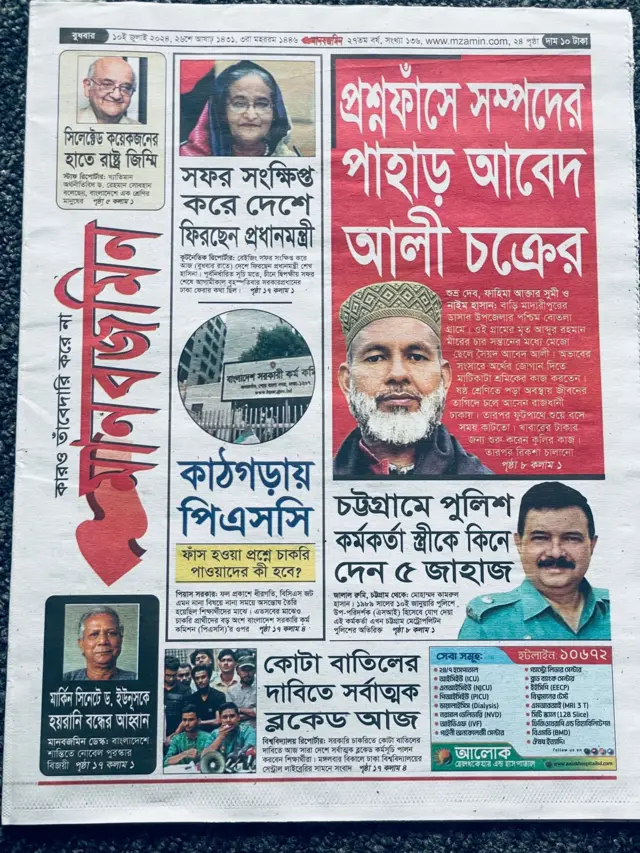
Everyone is a millionaire in the question leak cycle — this is the front page news of Kale Kantha magazine. Here it is said that most of those who are involved in cheating the recruitment exam have become owners of crores of rupees. But the owner of the most money is driver Abed Ali, who now has at least 50 crores of wealth.
Bangladesh Bank has seized the bank accounts of 17 people, including three senior officials of PSC, on allegations of question leak. Among them is Syed Abed Ali, former driver of PSC chairman.
According to Bangladesh Financial Intelligence Unit (BFIU) sources, letters regarding seizure of bank accounts have been sent to the chief executives of various banks and financial institutions. The letter also mentions that the bank account will be seized until the case is settled.
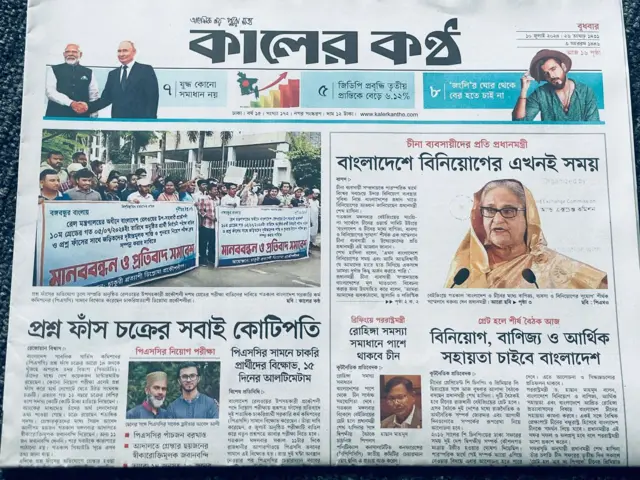
They are involved in job question paper leak, PSC knew — this is the headline of Dainik Prothom Alo. It is said here that among the 17 people who were arrested last Monday in connection with the leak of the question paper of a railway recruitment exam, six of them are Bangladesh Public Works Commission (PSC) officials.
Of those six, five are still working. Another was sacked 10 years ago for question paper leak. All those who are still working have been accused of being involved in leaking recruitment exam papers at various times.
In the case of three of them, the PSC found the truth of the allegations. Because of which one was not promoted. One person was transferred from Dhaka to Sylhet. Another was fired but was reinstated through legal proceedings.
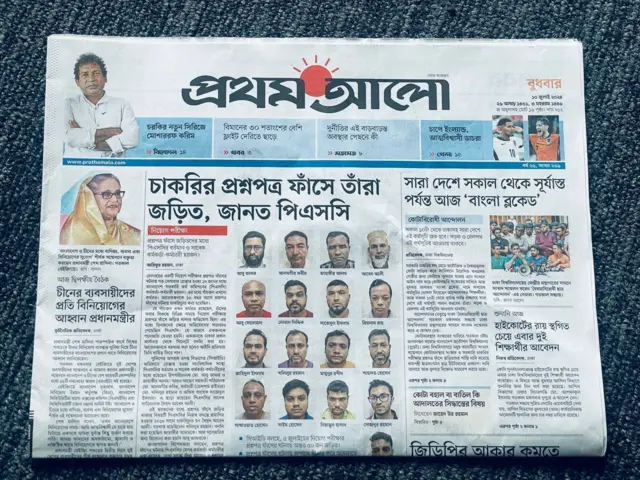
At least 30 leaks in 12 years or at least 30 leaks in 12 years – The headline of The Daily Star says that a circle of officials of the Bangladesh Public Service Commission (PSC) has leaked at least 12 government appointments including the Bangladesh Civil Service Examination (BCS) in the last 12 years. Leaked 30 question papers of the exam.
According to the investigators, this cycle has been active for almost two decades. Among the 17 people arrested in connection with the question paper leak, one is former PSC driver Syed Abed Ali, who lost his job in 2014 for his alleged involvement in the question paper leak.
But even after being sacked from PSC, he continued the activities of the ring and he also involved his son in this questionable ring.
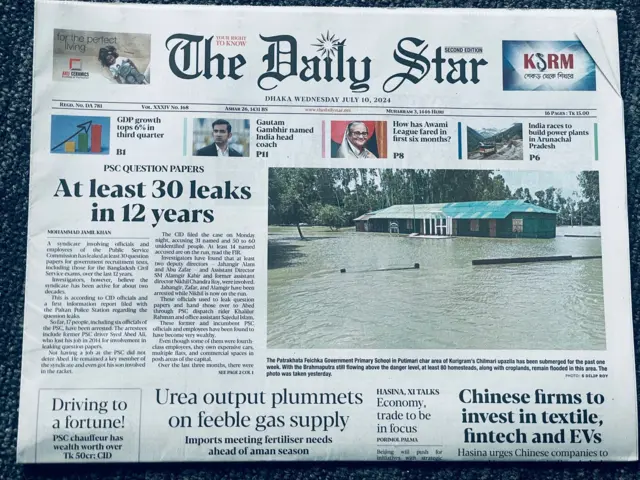
Sajedul used to question gang ‘guru’ Abed — The main headline of Samakal newspaper said that PSC office assistant Sajedul Islam was one of those who used to question the gang ‘guru’ Abed Ali, who was involved in the Bangladesh Public Service Commission (PSC) question paper leak. .
After collecting the question paper about despas rider Khalilur Rahman, he gave it to Abed Ali. He was supposed to get Rs 1 crore for providing questions for the latest Railway Assistant Engineer recruitment exam. But Abed Ali gave him 75 lakhs. Then through other members of the circle that question goes to some examinees.
Sources involved in the investigation say that the circle has been leaking questions of various recruitment tests for an age. It is believed that a group centered on BG Press is involved.
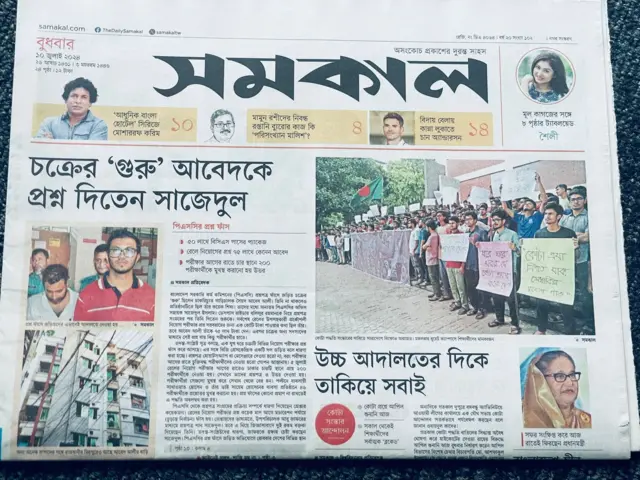
Today morning and evening across the country ‘Bangla Blockade’ — this is the main headline of Naya Diganta Patrika. According to this report, the agitating students have announced a ‘Bangla Blockade’ program across the country under the banner of ‘anti-discrimination student movement’ on Wednesday morning and evening to demand reform of the quota system in government jobs.
Bangla blockade program will start from 10 am today and will continue till sunset. During this time, all the highways and railways of the country will be covered by the blockade.
The government canceled the quota system in 2018 due to the students’ movement demanding reform of the quota system in government jobs. Later in 2021, when the children of some freedom fighters petitioned the High Court, the quota system came back again through a judgment on June 5 of this year. Following the verdict, the students of various universities of the country again joined the quota reform movement from the day after the verdict.
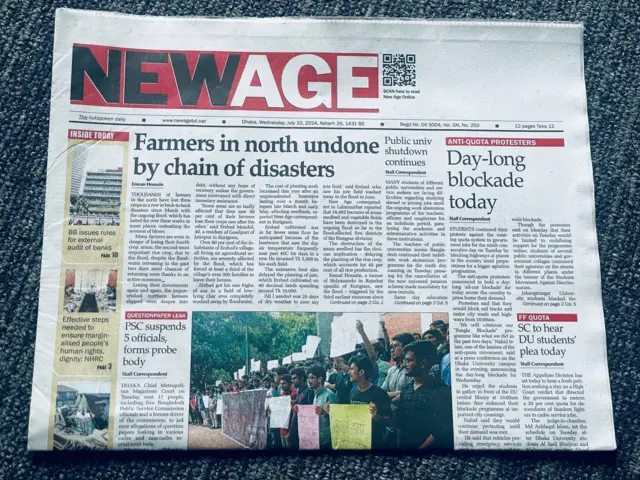
Farmers in north undone by chain of disasters — this is the main headline of New Age newspaper. It is said here that thousands of farmers in the northern part of the country have lost their crops in three consecutive rounds due to the ongoing calamities including floods since last March.
These disasters have lasted for more than three weeks in some parts of the region causing crop failure. Although the flood situation in those areas has improved over the past two days, many farmers are also at risk with the yield of the fourth crop of Aman paddy.
Farmers in the north are repeatedly losing their investments and burdened with debt.
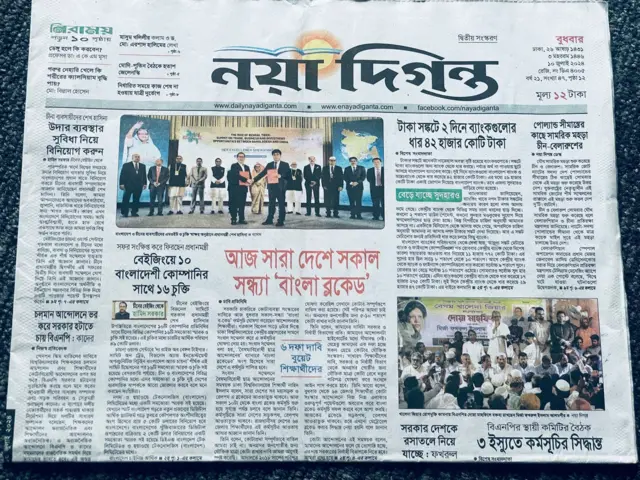
March pressure on databases — that’s the headline in today’s paper. It is said here that the verification of information by government agencies from the National Data Repository has increased abnormally. Usually, on an average, 45,000 people’s information is checked every month, but in March this year alone, these organizations checked the information of about 450,000 people.
The National Identity Registration Department called the number ‘excessive and unusual’. They say that organizations are under pressure to verify additional information on biometric identification servers. This is disrupting the normal work of the Election Commission (EC). The Commission has also written to the National Telecommunication Monitoring Center (NTMC) to reduce the rate at which information is being verified at present.
NTMC is the repository of all the national identity card and telephone contact information of the people of the country. Various government agencies including all the law enforcement, investigation and intelligence agencies of the country get information from NTMC as per their requirements.
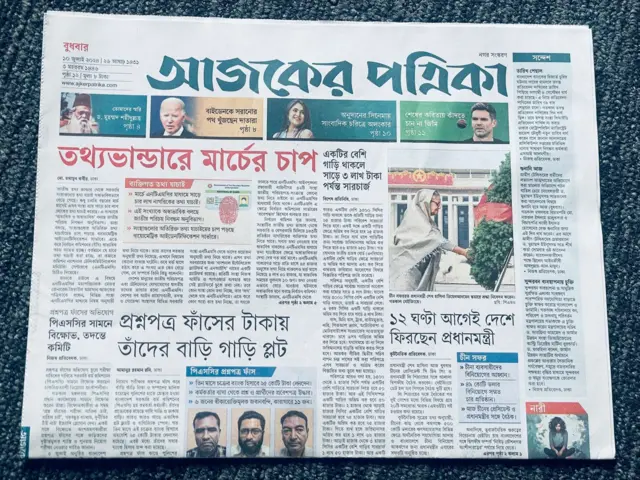
One and a half lakh printers 15 lakhs — this is the main headline of Desh Parwand magazine. Here it is said that the Rural Electrification Board (REB) has bought one laser printer for printing documents for 15 lakh 59 thousand rupees. But the price of the same quality printer in the market is 1 lakh 60 thousand rupees.
Similarly, various products including router, computer, laptop, sleep printer, AC have been bought at a much higher price than the market price. These goods have been supplied and installed in various rural electricity societies by the state power distribution organization.
At least three officials of REB have alleged that checking all the information of the goods that REB buys for the country’s 80 rural electricity societies will reveal a huge amount of corruption.
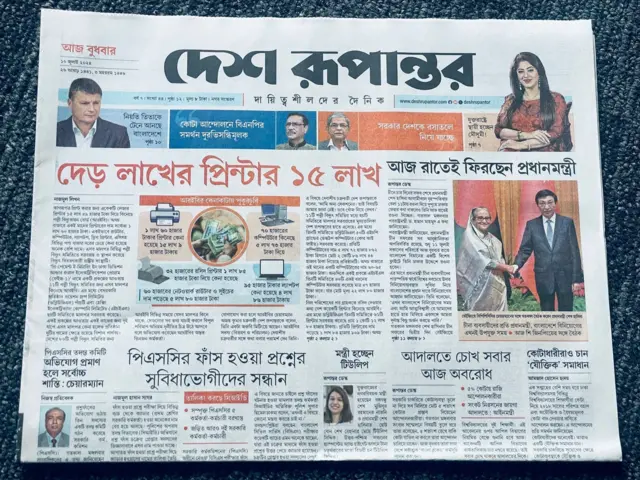
Now is the right time to invest in Bangladesh — The headline in Jugantar newspaper said that Bangladesh Prime Minister Sheikh Hasina urged Chinese businessmen to invest in Bangladesh at a conference in Beijing on ‘Trade, Business and Investment Opportunities between Bangladesh and China’.
“Now is the time to invest in Bangladesh and I am confident that together we can achieve great things,” he said in his speech.
During the four-day bilateral visit to China, 16 memorandums of understanding (MOU) were exchanged between some institutions of Bangladesh and China.
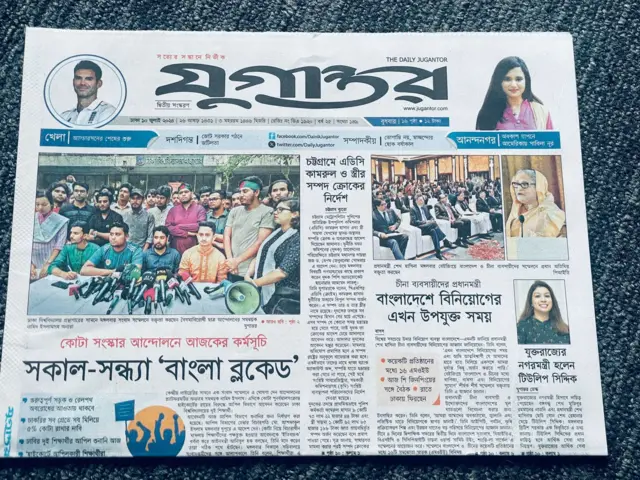
The crisis deepens in the industrial sector — this is the headline of the daily Ittefaq newspaper. It is said here that the crisis in the country’s industrial sector is deepening. On the one hand, uninterrupted fuel is not met, on the other hand, due to the increasing dollar price, the cost calculation is not met. Keeping the factory running has to be calculated due to the constant increase in costs. Due to the impact of this crisis on the economy, growth in the industrial sector has slowed down.
Stagnation has also been observed in private investment. The price of the dollar is increasing at an unusual rate and the entrepreneurs are calculating the loss by investing as before. Bank loan interest rate has increased to over 14 percent. As a result even good entrepreneurs are now defaulting.
Attempts to control the dollar market by cutting imports have backfired for the economy, entrepreneurs say. This reduces the GDP growth, the government loses revenue and the income of the banks also decreases. Many large companies are unable to make a profit or recoup their investment. Due to these reasons, new industries are less developed.
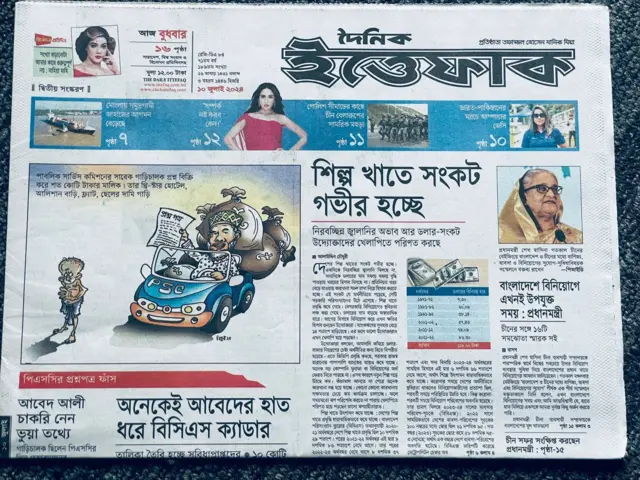
Bangladesh Bank in name of autonomy, in reality under government control — this is the main headline of the Merchant News. It has been said here that since the beginning Bangladesh Bank is the regulatory body of the financial sector of the country known as an autonomous institution.
Although an observation by the International Monetary Fund (IMF) states that ‘Bangladesh Bank’s autonomy is in the name of autonomy, but in reality it is a government-controlled institution.’
IMF’s statement in this regard is that Sections 10, 15 and 77 of the Bangladesh Bank Order-1972 are hindering the ability of the central bank to take any action to achieve its goals. This has come in the way of taking necessary steps to achieve inflation control targets, especially in the medium term.